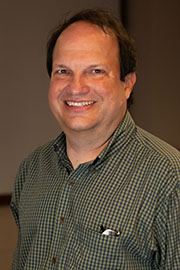
Education:
B.A., The Ohio State University
M.S., Northwestern University
Ph.D., Northwestern University
Postdoctoral Fellow: Universität Karlsruhe (TH), Germany
Contact Information:
Associate Professor of Chemistry
Areas of Expertise: Inorganic Synthesis, Crystallography, and Computational Chemistry
Charles Mahler has been teaching chemistry and doing chemistry research for more than 20 years. He started doing chemistry research as an undergraduate, and opportunities to do research have taken him to Germany and New Orleans since earning his Ph.D. He has taught Chemistry at Lycoming College since 1994 and has had the pleasure of working with many students in the classroom and lab.
Charles teaches Physical Chemistry (or PChem) and Advanced Inorganic Chemistry, and shares in the teaching of General Chemistry. He enjoys teaching with real world chemistry, be it having students test the calories in corn chips with the bomb calorimeter in PChem lab, touring a nuclear reactor as part of the Inorganic class, or turning aluminum soda cans into the compound alum in General Chem lab.
His research with students looks at synthesis of new compounds of selenium with various transition-metals or the properties of ruthenium phosphine complexes. His students have also done research in computational chemistry, and he has supervised internships where students work in an industrial lab. His research has resulted in published papers co-authored with students including:
- Alex D. Hunter; Trevor Robert Williams; Brandon M. Zarzyczny; Hans W. Bottesch, II; Sara A. Dolan; Kimberly A. McDowell; Dominique N. Thomas; Charles H. Mahler “Correlations among 31P NMR Coordination Chemical Shifts, Ru−P Bond Distances, and Enthalpies of Reaction in Cp′Ru(PR 3) 2Cl Complexes (Cp′ = η 5 ‑C 5H 5, η 5 ‑C 5Me 5; PR 3 = PMe 3, PPhMe 2, PPh 2Me, PPh 3, PEt 3, P n Bu 3)” Organometallics, 2016, 35, 2701-2706.”
Charles and his wife have two sons, who enjoy making baking soda and vinegar volcanoes and playing with dry ice.
Fun fact - Charles' dog is named "Gibbs" for Josiah Willard Gibbs, the first great American physical chemist (who developed the phase rule and for whom the Gibbs Free Energy is named).